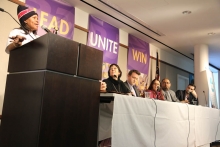Public service workers call for recognition and respect in the wake of Hurricane Sandy

Jon Forster, Vice President of AFSCME District Council 37, framed the meeting as a call to action: “We are the first responders. We need to talk about that, we need to share that, we need to educate [about] that amongst ourselves. We need to push that with the powers that be.”
Workers recounted their efforts preparing for Sandy and cleaning up in its wake – in many cases, volunteering to work overtime for no extra pay.
Members of TWU Local 100, the union of transit workers, shut down power across the city and moved trains to higher ground. According to Celeste Kirkland, a shop leader, workers stayed on the job upwards of a week without going home. The union got frequent calls from other unions asking for advice.
Nurse Gwendolyn Lancaster described frustration with management’s plan to plug in nurses and evacuate patients. Still, she said, “There were a lot of nurses who stepped up regardless of how they felt.” Members of the New York State Nurses Association volunteered at short-staffed hospitals, helping “to make sure folks didn’t know that they were understaffed.” NYSNA's Treasurer Patricia Kane told how the union also established a fund for affected members.
Workers from SEIU 32BJ demolished over 100 homes, saving residents tens of thousands of dollars that they would otherwise have to pay to contractors. Jimmy Brennan, a residential manager, told of residential workers who had to sleep in basements because bridge shut-downs prevented them from getting home.
For some sectors, privatization was a major impediment to appropriate disaster response. Before public utilities were handed over to Con Edison, explained John Duffy, national Vice President of the Utility Workers of America, public management would stockpile materials in the case of emergency. But as Sandy swept the city, the Con Edison company ran out of cable. “Privatization should not only be halted,” Duffy said. “It should be reversed.”
Matt Ryan, an organizer for the community group ALIGN, decried “fly-by-night contractors not paying [workers] what they promised, or not paying them at all” – especially in areas with large immigrant populations. ALIGN sent out organizers and lawyers to combat the abuses.
The event had a special out-of-town guest: Rosa Pavanelli, the newly elected General Secretary of the global union federation Public Services International. Pavanelli had spoken at a special session on water and disasters at the United Nations just the day before, March 6, at the invitation of UN Secretary-General Ban Ki-moon. On Thursday, Pavanelli told of workers rebuilding earthquake-ravaged towns in Italy – and similar challenges contending with the forces of privatization.
PSI Utilities Officer David Boys invoked transnational solidarity. “It’s not just New York. It’s not just New Orleans. It’s a global fight that we’re fighting,” he said. “We at PSI have linked these local fights to a global pushback against very powerful actors.”
Pavanelli summed up the challenge for labour in New York – and the world over –moving forward. “When something extraordinary happens, like what happened with Superstorm Sandy in New York, immediately public sector workers are the heroes, with a clear spirit of public service, using their skills and their time to help the community,” she said. “But afterwards, when the community has recovered from the shock of the disasters, decision-makers forget. We must be strong and take profit from our experience. If we organize and if we stay together, I think that we can do it.”
“Disasters validate who we are,” agreed Henry Garrido, Associate Director for DC 37. “But we can’t wait for that moment.”
A special report for PSI by New Internationalist writer James Cersonsky

